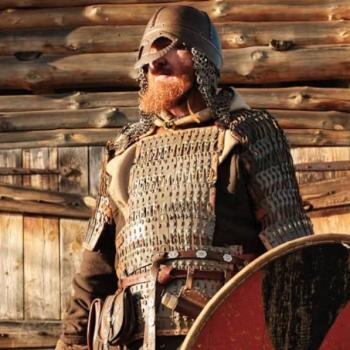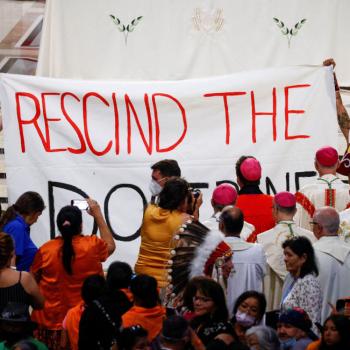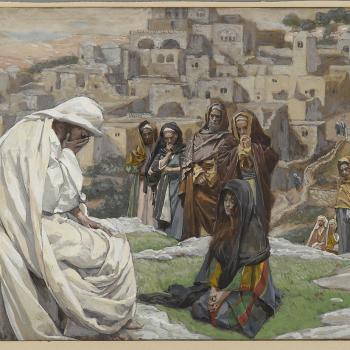
These essays on William R. Herzog’s Jesus Justice and the Reign of God have delved into Jesus’ politics and economics. They showed Jesus taking the side of peasants and landless laborers in their struggles under economic, political, and religious oppressors. Jesus castigated these latter groups for not acting justly toward the poor. But what about personal morality? Surely Jesus also expected peasants to act justly in their village lives even as pressures from power centers made that life difficult. Did he direct any of his exacting moral challenges toward his favorite people? What, for Jesus, did politics and personal morality have to do with each other?
This is the ninth post on Herzog II’s Jesus, Justice and the Reign of God. Earlier posts in the series are:
- The Historical Jesus and the Transcendent God in the Work of William Herzog
- Context Group Continues the Long History of Witnessing to Jesus
- Jesus Heals a Paralytic and Opens a Temple-Free Zone of Grace
- The Temple, Jesus, and the Little Traditions of Village Life
- A Rich Man Follows All the Old Rules. Or Does He?
- The Tradition of the Elders or the Mercy of God
- Jesus Reinterprets the Sabbath and Subverts the Social Order
- Dangerous Thoughts: Three Parables in Dissembling Villager Speak
I have made the mistake of ignoring the personal morality of the little people. Writing about crowds of poor villagers coming to John the Baptizer for forgiveness, I wondered what sense of guilt was driving them there. Surely, I thought, the centers of sin were the same as the centers of power in that world. But Jesus is also concerned about the morality or immorality of village life. One way to describe his lesson is: Don’t be like the big guys.
Personal morality and fictive kinship groups
The big guys in Palestine operated according to a moral ethos that exaggerated some common human impulses. Rivalry, getting ahead, avoiding shame and acquiring honor – these were all-important. Pursuing them in a society in which all goods, including honor, were limited meant everyone was everyone else’s rival. Each one’s gain was someone’s loss, and success was measured in conspicuous displays of wealth. Wresting that wealth from the poorest, least honorable members of society, especially the peasant class, was the favorite tactic. And the economic engine that facilitated that upward flow of wealth was debt, debt slavery, and foreclosure on peasant lands.
Not being like those big guys would mean a personal morality that abandons some very human impulses. It would have to do so in the face of what society’s influencers held out as most desirable. Little ones in scattered villages were certainly not immune to the temptation. Herzog says, “Village life was filled with grudges, grievances, small feuds, and efforts to indebt others, perhaps involving appeals to local courts.” (op. 213) The justice of the reign of God that Jesus proclaimed would not be like this. That is what Jesus’ new personal morality – “you have heard that it was said … but I say to you” – was up against.
Positively, not being like the elite means social interactions will be like those found in “kinship groups, or fictive kinship groups, where members regard each other as family.” (p. 213) Jesus gave the example of fictive kinship when he called those who do the will of God is brother, sister, and mother. (Mark 3:31-35) A village could be a fictive kinship group. Many of Jesus’ moral demands in Matthew’s Sermon on the Mount would foster that kind of relations among villagers.
You have heard … you shall not murder – on anger (Matthew 5:21-22)
Jesus begins his lecture on personal morality with a precept he doesn’t, it seems, always follow himself. He makes a big deal out of a very common emotion—anger:
I say to you that if you are angry with a brother or sister, you will be liable to judgment; and if you insult a brother or sister, you will be liable to the council; and if you say ‘You fool,’ you will be liable to the hell of fire.
I think how many times I have been angry with a brother or sister and said insulting things. But Jesus also was angry at times, and he called people names:
- Mark 3:5 – Jesus looked at the Pharisees “in anger” as they watched to see if he would heal a man’s withered hand on the Sabbath.
- Matthew 23:13-33 – “Woe to you, scribes and Pharisees, hypocrites!” Jesus uses the “hypocrites” epithet four times in this passage; also “fools” and “snakes.”
- Luke 13:32 – Jesus calls Herod Antipas a fox.
The problem is we generalize Jesus’ command to fit all times and places. But Jesus taught at a particular time and place, and there and then his words meant something specific. Jesus forbade anger at a brother or sister. Considering fictive kinship, as mentioned above, it seems Jesus probably meant a whole village of brothers and sisters. But not necessarily everyone in the world.
In that Palestinian village context, making a big deal of anger and name calling makes sense. Villagers lived under constant pressure from large landholders, lenders, Roman officials, and the religious establishment. Add in conflicts and tensions among themselves–and how easily they can escalate–and life becomes unbearable. Jesus says, Stop conflict before it has a chance to get out of control. Especially avoid name calling. Seek reconciliation instead.
Turning the other cheek (Matthew 5:38-42)
Reconciliation is a big part of personal morality for Jesus. Jesus has some unusual ideas about how to go about reconciling:
You have heard that it was said, ‘An eye for an eye and a tooth for a tooth.’ But I say to you, Do not resist an evildoer. But if anyone strikes you on the right cheek, turn the other also. And if anyone wants to sue you and take your coat, give your cloak as well. And if anyone forces you to go one mile, go also the second mile.
Villagers were familiar with the practice of striking on the right cheek. A superior would do that to shame an inferior. Think of a right-handed boss. Using his right hand he slaps an offending employee on the right cheek. It’s necessarily a backhanded slap, not with the full force of a forehand blow. More than hurting, it reinforces the recipient’s inferior status. He’s not worth the stronger blow, which (mind you) the boss could still give.
Now imagine how tempting for a villager to imitate this behavior. For whatever reason he feels an urge to put down another villager. He gives the backhanded slap on the right cheek. But this time the recipient refuses to accept inferior status. He turns the other cheek and tempts the other to give him all he’s got. He insists that the other party to the quarrel treat him like an equal. Imagine what happens next if both participants have already heard Jesus words: Turn the other cheek.”
Naked in the law court
The second villager above refused inferior status. He also refused to retaliate. In Jesus’ next story a villager goes beyond not retaliating. The setting is a law court, probably an open-air meeting space. The law says a creditor can appropriate a piece of clothing as surety for a debtor’s repayment of a loan. Normally it would be the tunic worn next to the skin.
Jesus recommends (this couldn’t be a command) that the debtor give the inner and outer garment, tunic and cloak. The point of the extreme action, Herzog says, “is that neighbors should not exploit the occasion to make a loan by extracting necessities from those in need.” (p. 214)
I suspect a further point is more clearly related to village life. The practice of using the law to get surety for a loan betrays a lack of trust. It works against the fellowship Jesus would like to see in a small village. Anyone ought to be ashamed to go to law in dealing with a village “brother” or “sister.” The action Jesus recommended would say, “You want assurance. I’ll give you assurance!” And the debtor walks away naked! The embarrassed creditor will not likely go to court again over a mere loan.
In light of this example of village private morality, Herzog suggests that Jesus’ conclusion to the whole lesson on retaliation is fitting:
Give to everyone who begs from you, and do not refuse anyone who wants to borrow from you. (Matthew 5:42)
Jesus’ prohibition against swearing – by heaven, earth, Jerusalem, by your head (5:33-37) – is absent from Herzog’s account. But this may also relate to lending and law courts. Oaths lent credibility to a declaration of intent. But villagers should trust that “Yes” means yes and “No” means no in their dealings with each other.
Going the extra mile
Jesus’ last example of not retaliating but reconciling concerns the way Jesus expects a villager to relate to a member of a foreign occupying force. A Roman soldier had the prerogative of commanding a civilian to carry his gear for a specified distance. John Dominic Crossan, in The Historical Jesus: The Life of a Mediterranean Jewish Peasant, specifies that it’s one mile.
Crossan pictures a Roman soldier accosting a Palestinian villager with the demand to carry his pack. The villager amiably continues well past the mile mark (1000 paces). The soldier suddenly realizes that he has unknowingly broken Roman law. Now he needs to act nice to his erstwhile lackey lest he and whatever witnesses there may be complain to his superior officer.
Herzog imagines a not so confrontational outcome. A surprising, ungrudging extra quantity of service by a subject of Roman oppression “may lessen the hostility and enmity between occupier and occupied.” (p. 215)
Marriage, divorce, and village life (Matthew 5:27-32)
You have heard that it was said, ‘You shall not commit adultery.’ But I say to you that everyone who looks at a woman with lust has already committed adultery with her in his heart.
We think of marriage as an arena for private morality. But in first-century Palestine adultery disrupts the whole village. (p. 215) Marriage is a matter of property rights and the tenth commandment:
You shall not covet your neighbor’s house. You shall not covet your neighbor’s wife, or male or female slave, or ox, or donkey, or anything that belongs to your neighbor. (Exodus 20:17)
When all goods, including women, are limited, competition for them is intense. Herzog quotes another scholar:
[W]omen are contested resources … so much so that kidnappings, abductions, elopements, and the capture of concubines appear to have been frequent occurrences. (Jane Schneider, quoted in Crossan, Historical Jesus, p. 14)
It’s “a stage for endless village conflicts,” Herzog adds. And,
[T]o stare at a woman lustfully was a socially explosive act … threatening to bring shame on the family by despoiling one of its women. Similarly, divorce created havoc and often led to conflicts over contested resources. (p. 215)
Custom and ancient law permitted divorce if a man only gave his wife a “certificate of divorce.” (Matthew 5:31) Jesus outlaws divorce entirely except on the grounds of unchastity; “screwing around” Herzog’s translates. Such behavior “creates chaos and animosity in small communities.” The relationship could hardly be called a marriage.
Jesus’ concern was family life “as part of the village.” He desired also to protect the weak. In cases where unchastity was not an issue, the woman was vulnerable. Contrary to expectations, in a world where men are socialized to be aggressive, Jesus “turns the acceptable aggressor into the sinner….” p. 214-15)
Conclusion
It’s possible that Jesus didn’t make the distinction between public and personal morality that seems obvious to us. Seemingly private interactions between individuals, at least in Palestinian village life, have larger social implications. So do sexual behaviors and intra-family squabbles that lead to divorce.
When Jesus faced the issues of economic, political, and religious oppression by economic, political, or religious powers, he did not dream of top-down reform or bottom-up revolution. Rather, the fictive kinship of village life, transformed with a reinvigorated Law – “You have heard that it was said … but I say to you” – was where he would locate the counter-cultural justice of the reign of God.













